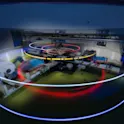Astronauts in crewed Mars missions could misread vital emotional cues
By Tania Fitzgeorge-Balfour, Frontiers science writer Long-exposure photo of the centrifuge used to simulate microgravity in the research subjects. Image: DLR Spending an extended period with reduced gravity, as would be experienced by astronauts on long space missions, may have a negative effect on cognitive performance, and in particular emotion recognition, reveals a new study. Hoping to counteract these changes, researchers found that short periods of artificial gravity did not have the desired effect. The findings of this study could have implications for effective teamwork in future space travel, especially for manned missions to Mars. Living for nearly 2 months in simulated weightlessness has a modest but widespread negative effect on cognitive performance that cannot be counteracted by short periods of artificial gravity, finds a new study published in Frontiers in Physiology. While cognitive speed on most tests initially declined but then remained unchanged over time in simulated microgravity, emotion recognition speed continued to worsen. In testing, research participants were more likely to identify facial expressions as angry and less likely as happy or neutral. ► Read original article► Download original article (pdf) “Astronauts on long space missions, very much like our research participants, will spend extended durations in microgravity, confined to […]














